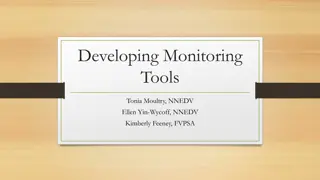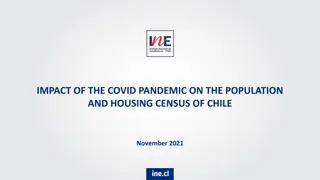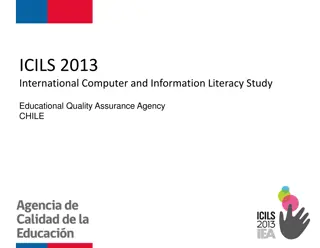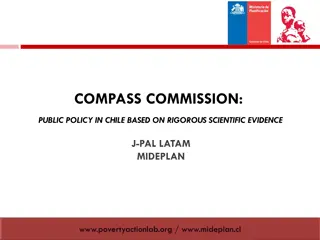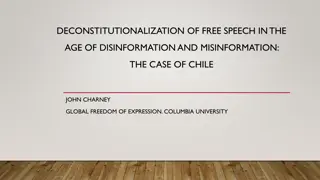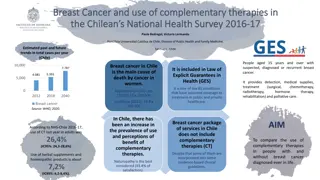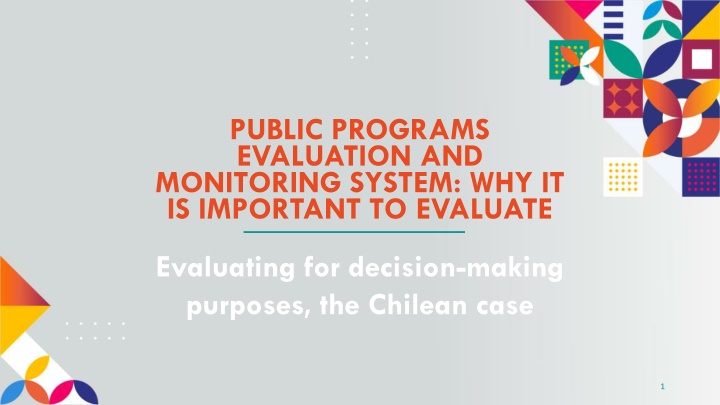
Chilean Public Programs Evaluation: Importance and Evolution
Discover the significance of evaluating public programs for decision-making in Chile, the development of evaluation systems from 2008 to 2022, and how information is utilized for program improvement. Explore the key role of the Evaluation and Productivity National Advisory Committee, the Monitoring process, and analysis tools like mapping public programs in enhancing the quality and effectiveness of public initiatives.
Download Presentation

Please find below an Image/Link to download the presentation.
The content on the website is provided AS IS for your information and personal use only. It may not be sold, licensed, or shared on other websites without obtaining consent from the author. If you encounter any issues during the download, it is possible that the publisher has removed the file from their server.
You are allowed to download the files provided on this website for personal or commercial use, subject to the condition that they are used lawfully. All files are the property of their respective owners.
The content on the website is provided AS IS for your information and personal use only. It may not be sold, licensed, or shared on other websites without obtaining consent from the author.
E N D
Presentation Transcript
PUBLIC PROGRAMS EVALUATION AND MONITORING SYSTEM: WHY IT IS IMPORTANT TO EVALUATE Evaluating for decision-making purposes, the Chilean case 1
PUBLIC OFFER EVALUATION AND MONITORING SYSTEM Contribute to improve the quality of public programs, information, executive conclusive inputs involved in decision making. giving and people MAIN OBJECTIVE for
EVALUATING FOR DECISION MAKING: THE SYSTEM EVOLUTION 2012 2022 2008 In November 2021, Finance Ministry approved the N 1510 regulation that Creates Evaluation and Productivity National Advisory Committee. Chilean State Law create Social Development and Family Ministry (MDSF) and designated it, among others, the function of evaluate and give a recommendation about new and reformulated programs. Also, MDSF must collaborate with the follow up of the implementation of them. In 2008 initiate de Ex-Ante Evaluation of Public Programs. This process allows to have relevant information about programs design to give feedback in order to improve the Budgetary Formulation Process and contribute to public invest transparency. regulation that establishes criteria and procedure for determination of programs that will be part of social public invest and regulates the evaluation and recommendation reports of social programs. In March 2022 MDSF approved The Monitoring process started as a pilot of Budget Management Chilean Office in 2012. This process allows to follow the execution of social programs, knowing their level of progress. In March 2022, Finance Ministry approves the regulation for Evaluation of Public Programs and Institution System.
PUBLIC PROGRAMS EVALUATION AND MONITORING SYSTEM: HOW IS THE INFORMATION USED? Evaluation and monitoring of EXISTING public programs Correct structural weakness Execution (Mid Term) Execution (Long Term) Design Yearly agenda defined by Economy Ministry, DIPRES and SES, in concordance with long term agenda that defines Evaluation and Productivity National Committee. Correct repeated findings Correct findings Ex Dure Monitoring Ex Ante Evaluation Ex Post Evaluation Formalize committed adjustments Social Evaluation Undersecretary (SES) Public Services Budget Management Office (DIPRES)
ANALYSIS TOOLS: MAPPING PUBLIC PROGRAMS Map of public programs by number of programs, budget and thematic dimensions Social Development Report 170 specific problems 46 main problems 10 dimensions DATA SOCIAL PLATFORM https://datasocial.ministeriodesarrollosocial.gob.cl/programas/dimensiones https://www.desarrollosocialyfamilia.gob.cl/informacion-social/informes-de-desarrollo-social
EVALUATION SYSTEM CHALLENGES Strengthen the integration of different lines of evaluation under a systemic view of the Evaluation and Monitoring cycle. Strengthen the institutional framework of the system, promoting coordination among the different actors that compose it. To make progress in assuring the quality of the information that makes up the Monitoring and Evaluation System. To advance in the mainstreaming of the human rights approach in the different lines of evaluation. Encourage the use of the results of the Evaluation System, so that Public Managers and Authorities have information that allows them to make decisions, making progress in improving the performance of their programs and using this information as a management tool.
PUBLIC PROGRAMS EVALUATION AND MONITORING SYSTEM: WHY IT IS IMPORTANT TO EVALUATE THANK YOU 7






